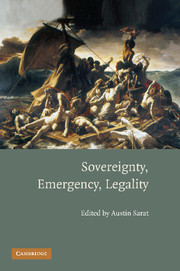Book contents
- Frontmatter
- Contents
- Contributors
- Acknowledgments
- Introduction: Toward New Conceptions of the Relationship of Law and Sovereignty under Conditions of Emergency
- 1 The “Organic Law” of Ex Parte Milligan
- Comment on Chapter 1: David Dyzenhaus, “The ‘Organic Law’ of Ex Parte Milligan”
- 2 Emergency, Legality, Sovereignty: Birmingham, 1963
- Comment on Chapter 2: “Order” in the Court
- 3 The Banality of Emergency: On the Time and Space of “Political Necessity”
- Comment on Chapter 3: Emergencies, Body Parts and Price Gouging
- 4 The Racial Sovereign
- Comment on Chapter 4: Toward a Nonracial Sovereign
- 5 Should Constitutional Democracies Redefine Emergencies and the Legal Regimes Suitable for Them?
- Comment on Chapter 5
- Index
3 - The Banality of Emergency: On the Time and Space of “Political Necessity”
Published online by Cambridge University Press: 07 May 2010
- Frontmatter
- Contents
- Contributors
- Acknowledgments
- Introduction: Toward New Conceptions of the Relationship of Law and Sovereignty under Conditions of Emergency
- 1 The “Organic Law” of Ex Parte Milligan
- Comment on Chapter 1: David Dyzenhaus, “The ‘Organic Law’ of Ex Parte Milligan”
- 2 Emergency, Legality, Sovereignty: Birmingham, 1963
- Comment on Chapter 2: “Order” in the Court
- 3 The Banality of Emergency: On the Time and Space of “Political Necessity”
- Comment on Chapter 3: Emergencies, Body Parts and Price Gouging
- 4 The Racial Sovereign
- Comment on Chapter 4: Toward a Nonracial Sovereign
- 5 Should Constitutional Democracies Redefine Emergencies and the Legal Regimes Suitable for Them?
- Comment on Chapter 5
- Index
Summary
Introduction
Emergencies are sudden and dramatic. They call forth an immediate response. When a state of necessity emerges, time becomes compressed. We know this all too well from popular culture, in particular the frantic actions of Jack Bauer on Fox television's 24. Bauer is an expert at torturing the “ticking bomb terrorist,” and the urgency of his actions are refl ected in his frequent (non)explanation to his bosses further up the bureaucratic ladder of the counterterrorism unit: “there's no time, I'll explain later.” In a condition of necessity, there is no time. Jack Bauer, and Jack Bauer alone, must decide what to do in that moment of crisis. Without time, Jack Bauer is sovereign. Or, more accurately, Jack Bauer is sovereign because there is no time.
Emergency is closely connected in discourse and practice to the concept of necessity. When extra-legal action is taken in an emergency, the justifi – cation is necessity, and here the term brings forth at least three distinct but related meanings: the idea of crisis or urgency itself (the state of necessity being synonymous with a state of emergency), the idea of indispensability (an action is a necessity because it is the only available means of overcoming the crisis condition) and the idea of inevitability (as more than one commentator on emergency powers has states, in such a condition, agents of the state will as a matter of course, do “whatever it takes”). Tick-tock, ticktock. ‥ Emergency and necessity: there is no time, there is only one thing to do, and such a thing will be done.
- Type
- Chapter
- Information
- Sovereignty, Emergency, Legality , pp. 136 - 164Publisher: Cambridge University PressPrint publication year: 2010
- 16
- Cited by



